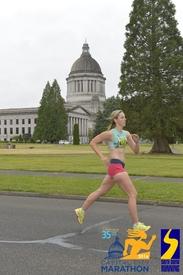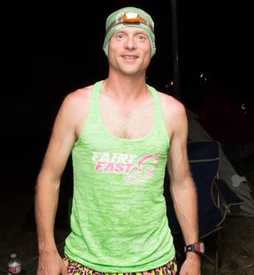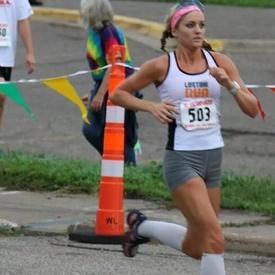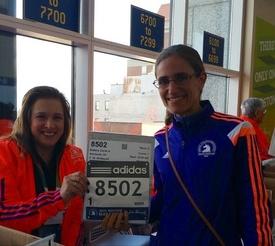At what distance do you plan on bringing water

arussell134
Posts: 463 Member
Hi all - just discovered this group! I've been running off and on for the better part of 15 years now, every where from 5ks to full marathons. After a hiatus, I've dropped 25 pounds and am training for a half marathon. However, it's been several years since I've tackled this distance!
Since I'm training solo here, I'm starting to wonder when I should absolutely plan on bringing water on my long runs. I'm currently back up to 8 miles, and have done that distance without water (though it was a bit of a stretch). Thinking of planning on it for my 10 this week.
Just curious what everyone else does - and how they bring water? Not sure I want to wear a water pack, thinking I might buy one of those hand-held water bottles. Thoughts?
Since I'm training solo here, I'm starting to wonder when I should absolutely plan on bringing water on my long runs. I'm currently back up to 8 miles, and have done that distance without water (though it was a bit of a stretch). Thinking of planning on it for my 10 this week.
Just curious what everyone else does - and how they bring water? Not sure I want to wear a water pack, thinking I might buy one of those hand-held water bottles. Thoughts?
0
Replies
-
I bring water almost all the time unless I'm doing something fairly short. I think I'd be OK without it for anything under an hour, but I like to have it anyway. I like to time my drinking with the locations of the water stops for my upcoming race. I figure, if I'm training for a race where I'm definitely going to be taking fluids, I might as well be taking in fluids during my training, and in roughly the same intervals, so I that my body is used to it.
FWIW, I use a Camelbak Quick Grip water bottle. Don't know if there are better options but it keeps my water pretty cool without making my hand cold.
I will say that it's easier to run without a bottle. I hadn't noticed it being harder when running with the bottle, but when I did some short runs in my taper before my last race, I ran without the bottle (since I wouldn't be carrying it in the race) and noticed it was a bit easier and more efficient without it.0 -
On the road I usually won't worry about water for anything less than 15 miles under normal conditions. If I'm going on trails I will usually grab my belt around the 10 mile mark; I'd rather have it and not need it.0
-
I bring water if I am running over 20 miles and it is really hot (this never happens, as I only do spring marathons so most of my long runs happen in the winter).0
-
above 10 miles for me. Though if it's not much above I'll just a £1 coin and plan a route with a shop where I can buy a bottle. Under 15miles I'll tend to go with a belt with a couple of water bottles (brand is Fuel Belt). Above that I like a back pack water bladder.0
-
Rarely do I ever take water. Only if it's very hot and humid and I'm doing 18 or more. I routinely do long runs of 18+ miles with no water or fuel. The body is designed to handle this. It's more about personal preference than anything else.0
-
Running on a cool Fall day is a lot different than a hot August day, so there's that. But basically you drink if you are thirsty, so it depends on you. If you can run 18 miles without getting really thirsty, then go for it! If my run is going to be over 2 hours I take water unless it's super hot then I will bring water if it's less than half that.0
-
above 10 miles for me. Though if it's not much above I'll just a £1 coin and plan a route with a shop where I can buy a bottle. Under 15miles I'll tend to go with a belt with a couple of water bottles (brand is Fuel Belt). Above that I like a back pack water bladder.
I actually considered this option for my 10 milers+. There is a 7-11 and a couple grocery stores at the halfway point. Hmmmm.
0 -
Thank you everyone for your thoughts and taking the time to respond!
 Much appreciated. 0
Much appreciated. 0 -
Why not try it out - bring some water with you but don't drink it unless you feel thirsty. After a few times you'll get a sense of whether it's worth carrying or not!
Another thing I do is to bring the water bottle but only part-fill it. I'm never going to drink the whole thing, so I don't see why I'd bother carrying it either.0 -
I'm currently up to 15k without water/nutrition. I have hit 16k once without water. It was an out and back and I probably could have gone further, but didn't want to risk it. I have had some funky vision after the odd run or two, but generally 15k is currently my limit. I'm not likely to push past it for the next few months as we head into summer in Aus, if anything I'll start taking water on shorter runs as I run in the heat of the day 3-5pm.
I personally struggle with the bring but don't drink unless thirsty option. If I have hydration with me I will use it.0 -
When I'm running about 5-6 miles or less, I just travel without liquids. On longer runs, I tend to plan my route so I can keep on coming back to my starting point and grabbing a quick drink of water or sports drink (tend to stash it in the back of my vehicle) every few miles.
I do tend to train early in the morning before it gets too warm too.0 -
I run everywhere with a hydration pack. I used to go out even for short 3-5 milers without but always wanted to sip some water along the way. Once I began running in the Marathon - 50K plus range I started with the pack and now I carry it always and I am always hydrated. Just need to resist the urge to drink more than needed..
I found this article here and it speaks to the issue pretty well I think: http://www.runnersworld.com/drinks-hydration/sipping-points?page=single
0 -
I pre-hydrate, so I rarely carry water for training. I may carry a small bottle on distances over 10 miles, but that has varied depending on where I run (if there are water fountains) and the weather. I run in a humid and hot location (Texas), so the summers are my only real problem with hydration.
During longer races (10k or half-marathons are the only "long" races I've done), I'll get some water or sports drink at some of the stops, depending on how I feel.0 -
Depending on the weather for me really... BUT usually over 2 hours, I like to have water.0
-
Water over 2 hours, gel flask over 2.5 hours.0
-
just realize that, when you feel incredible thirst, it's going to be too late to stop the cascade of hormones that have been released into the body and the effects they will have on your systems. I always try to remember this and learn when my body is close to giving me those thirst signals and drink before they come on. I can get a lot more geek on the physiology of this, but it's kinda like the point where you feel your energy running low in a marathon, it's too late to "recarb" at that point.
so, for me, I can go 16 miles in cool weather without issue, but when its NC humid and hot, I know I start feeling the effects at about 60-75 minutes into the run.0 -
I tend to have rather low blood pressure and in hot and humid Florida if I haven't had any fluids in a 8 mile run I am pretty lightheaded when running and even more so when I stop. So I have been drinking if running for more than an hour to avoid that. I don't always carry fluids- sometimes I run loops and drink at the starting point.
-0 -
When I started running I would hoover up a 500ml bottle in 5Km of run/ walk.
Nowadays I'll only carry water if I'm going out for 12km or more, but I'd anticipate the need for that to reduce as my conditioning improves again.
When I raced a trail HM two weeks ago I went out with two 500 ml bottles, and only drank about half of that.0 -
I have been wondering this myself lately. I currently run around a lake (about 10mins around/lap) so I can get back to my car, where my water is stored, if necessary. I have thought about a hydration belt so that I am not tied to the lake, but I am also allergic to bee/wasp stings, and need to have an epi pen available as well. I haven't bought anything yet as I can't find a hydration belt with a pocket big enough to carry my epi pen.... /sigh. The search goes on.0
-
How big are epi pens? One of those bottle belts that just carries one bottle in the small of your back (sort of at a diagonal angle) might work as they tend to have space for a bigger pocket than the ones with multiple bottles.0
-
This depends somewhat on weather for me but anything over 6 miles and I'm definitely bringing water. If it's summer I bring it period.0
-
I have been training for my first marathon and as a consequence running longer and longer distance. Partly as a way to experiment, I started trying to extend the distance I can run without water or fuel (in cool, early morning conditions where I'm not sweating too much from the heat/humidity)... this morning I had a new long run without either fuel or water - 11.5 miles (about 2 hours 20 minutes of running). On my race-simulation long runs I start fueling and hydrating around 4 miles into the run and then pretty regularly about every 20 minutes after that at least, but I'm finding that I CAN run pretty long distances without needing food or fuel.
I used to think people who would say you didn't need food or fuel for a half marathon were crazy, but now i think they were just more experienced distance runners that knew you COULD train to run that way if the conditions were right.0 -
I wanted to hop back here and tell everyone the plan I have for my 10-miler tomorrow. In looking at my route, I realized I'd be 2 blocks away from a friend's house. I emailed her and she said she'd leave a glass of water on the front porch for me. Bonus, she's really close to the halfway point of my out-and-back.

Thanks so much everyone for your advice.
As a reminder, I did OK last week on my 8-milers (though I definitely refueled afterwards). I think I may worry about this more on the 10 mile+ runs I do. It's definitely NOT hot here in Western Washington these days (in fact, we have enviable cool, brisk fall weather right now).
So glad to be a part of this group!!0 -
This depends on the weather and how well I've been hydrating!
At 10 miles, I'll always carry water.
Below 6, almost never.
It's 6-10 where I'll make a decision based on weather and how well hydrated I am. If I haven't been drinking anything and it's under six miles, I'll just chug a bunch of water. Over six and I'll half-fill my handheld instead.
I really hate being thirsty, but I know I won't overdrink.0 -
I have one of those handheld bottles and I bring it for anything over ~6 miles. They're really pretty handy once you get used to them. I also like to bring a Gu for a 9+ mile run, and they've got a little pocket to stick that in.0
-
I live in Texas and I rarely run any distance without water. I use a 20oz handheld and will drink most of it in 5 miles. I run mainly on trails though, if that makes any difference.0
-
For road runs, I carry nothing for anything under 10 miles, a handheld for 10-20 miles and a Camelbak for anything over 20; For trails, I take my hand held for all runs under 15 and my Camelbak for anything over 15...0
-
In the summer, I go through about 20 oz of water an hour and carry water on every run. In winter, I only carry water for 10 miles or more.0
This discussion has been closed.






















